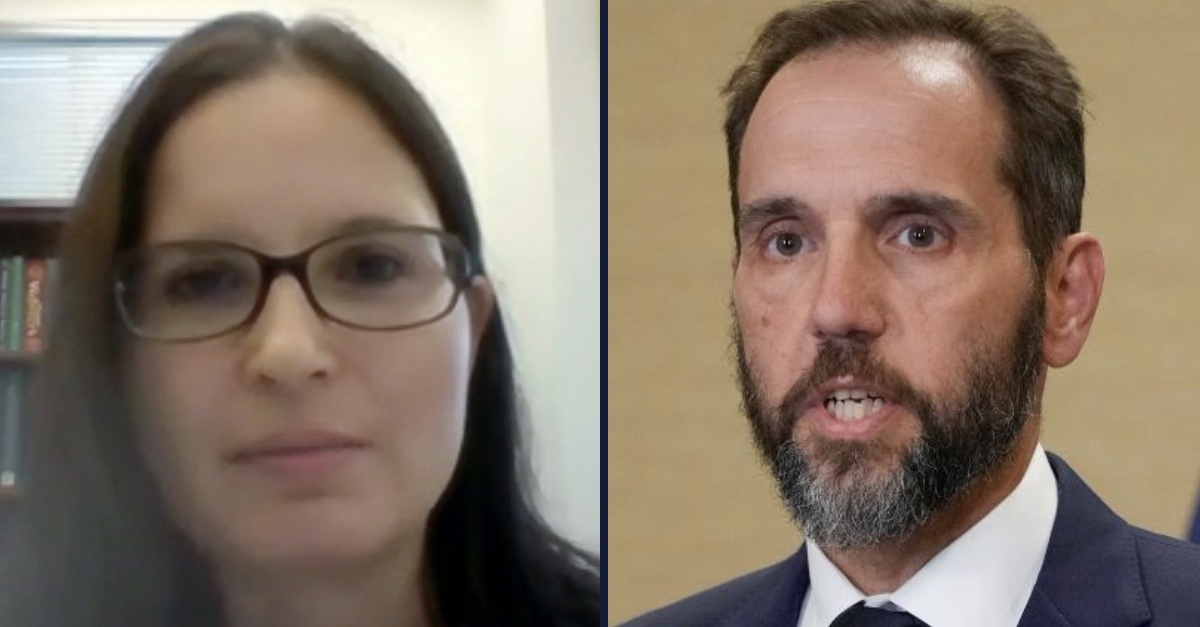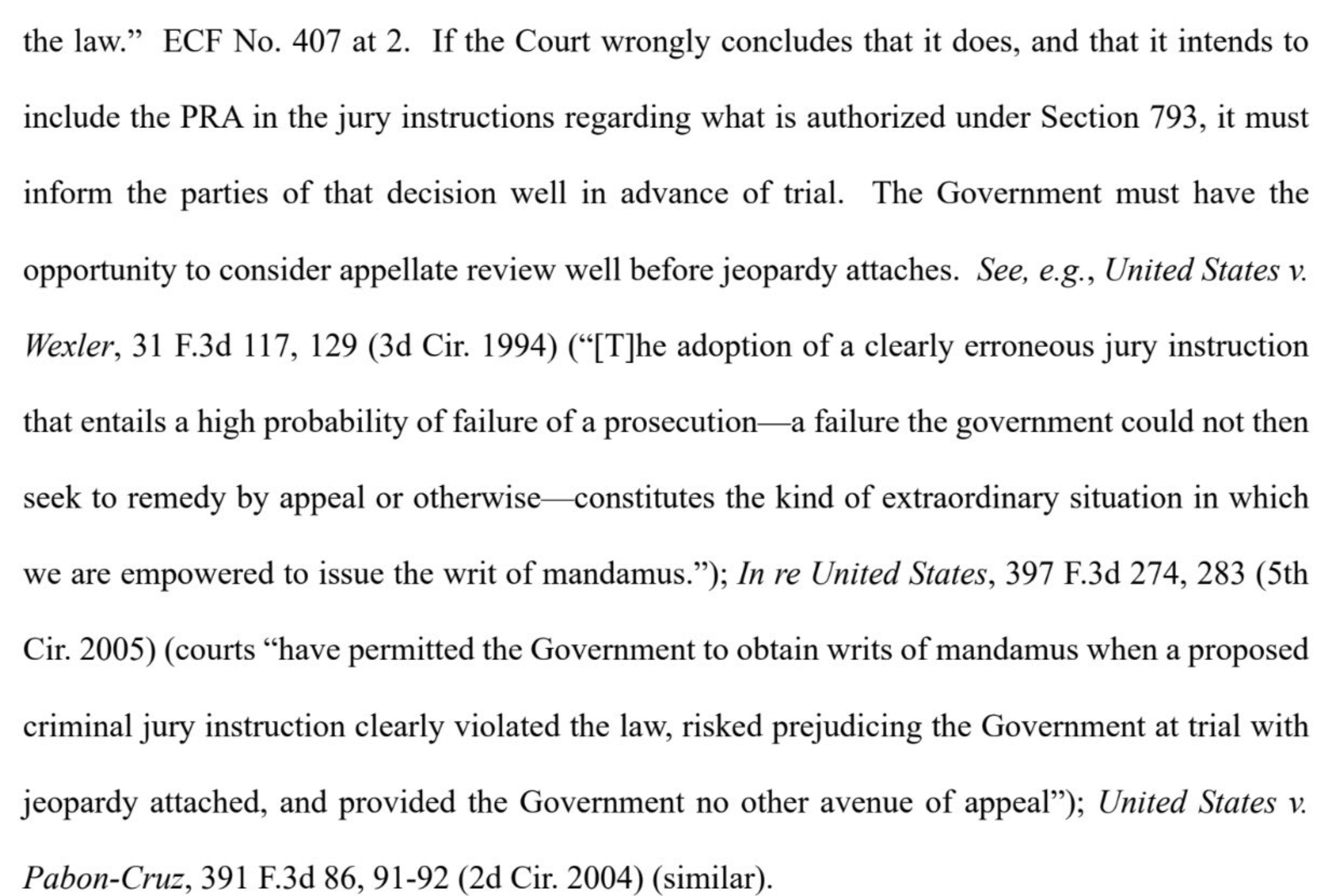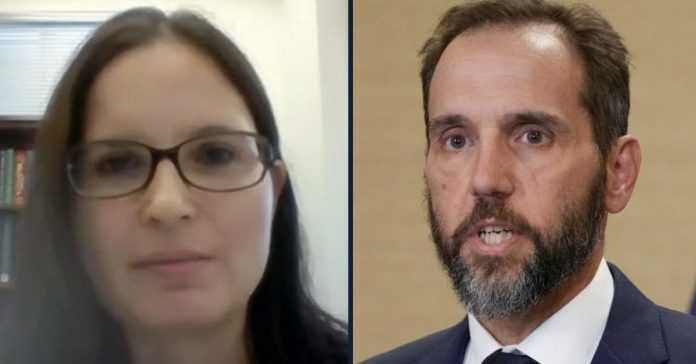
Judge Aileen Cannon (left) during a Senate Judiciary Committee oversight nomination hearing on July 29, 2020 (U.S. Senate via AP), Special counsel Jack Smith (right) speaks about an indictment of former President Donald Trump, Aug. 1, 2023, at a Department of Justice office in Washington. (AP Photo/Jacquelyn Martin)
The Special Counsel’s Office and Donald Trump’s defense both responded Tuesday to an order in the Mar-a-Lago case surrounding jury instructions on the Presidential Records Act (PRA), and the prosecution repeatedly hammered the former president’s arguments as “fictional,” “invented,” and “legally erroneous.”
U.S. District Judge Aileen Cannon on March 18 caused a stir by ordering the parties to file “proposed jury instructions limited to the essential elements” of Trump’s Espionage Act charges and to “engage with” two “competing scenarios and offer alternative draft text that assumes each scenario to be a correct formulation of the law to be issued to the jury [.]”
The scenarios, as Cannon posed them, asked the special counsel to grapple with defense notion that the PRA permitted Trump to unilaterally decide the classified documents at issue were personal records he was entitled to take and keep at Mar-a-Lago, thereby potentially dooming Espionage Act charges:
(a) In a prosecution of a former president for allegedly retaining documents in violation of 18 U.S.C. § 793(e), a jury is permitted to examine a record retained by a former president in his/her personal possession at the end of his/her presidency and make a factual finding as to whether the government has proven beyond a reasonable doubt that it is personal or presidential using the definitions set forth in the Presidential Records Act (PRA).
(b) A president has sole authority under the PRA to categorize records as personal or presidential during his/her presidency. Neither a court nor a jury is permitted to make or review such a categorization decision. Although there is no formal means in the PRA by which a president is to make that categorization, an outgoing president’s decision to exclude what he/she considers to be personal records from presidential records transmitted to the National Archives and Records Administration constitutes a president’s categorization of those records as personal under the PRA.
In his response Tuesday, special counsel Jack Smith said, in reality, the “PRA should not play any role at trial at all” and any jury instruction that suggests the PRA does have a role to play in challenging the willful retention of classified information charges is based on a “wrong” legal premise that would “distort the trial.”
The special counsel called it “vitally important” that Cannon “promptly” reveal her view and resolve the issue “well before jeopardy attaches” at trial. Smith explained the timing is important because prosecutors “must have the opportunity to consider appellate review” if Cannon “wrongly” decides to “include the PRA in the jury instructions regarding what is authorized under Section 793.”
In other words, the special counsel is telling the judge she “must” rule on this question of law swiftly. If she sits on it until trial and rules in Trump’s favor, it would mean “legally erroneous” jury instructions that could lead to the former president’s acquittal would be part of the case — and if he did end up acquitted, perhaps even through a directed verdict of acquittal that Cannon may issue, double jeopardy would prevent another trial, and there’s nothing the government could do about it.
As noted on the Prosecuting Donald Trump podcast, Smith cant wait until a jury is sworn and double jeopardy attaches (when Cannon can unilaterally tank the case); he’s ready to take her to the 11th Circuit. DOJ won 2x before there; now, it will be 3 strikes and you are out.
— Andrew Weissmann (weissmann11 on Threads)? (@AWeissmann_) April 3, 2024
On the other hand, if the judge reveals her position sooner rather than later, Smith can go back to the U.S. Court of Appeals for the 11th Circuit to correct Cannon’s “error,” as has happened before. Smith strongly hinted that he’s prepared to seek the “extraordinary remedy” of a writ of mandamus if Cannon rules against him:

“[T]he question of whether the PRA has an impact on the element of unauthorized possession under Section 793(e) does not turn on any evidentiary issue, and it cannot be deferred. It is purely a question of law that must be decided promptly,” Smith said. “If the Court were to defer a decision on that fundamental legal question it would inject substantial delay into the trial and, worse, prevent the Government from seeking review before jeopardy attaches.”
All the more problematic, the special counsel said, is that Trump’s PRA reliance “is not based on any facts”:
Importantly, Trump has never represented to this Court that he in fact designated the classified documents as personal. He made no such claim in his motion to dismiss, in his reply, or at the hearing on March 14, 2024, despite every opportunity and every incentive to do so. As discussed below, the reason is simple: he never did so. Instead, he has attempted to fashion out of whole cloth a legal presumption that would operate untethered to any facts—without regard to his actual decisions, his actual intent, the unambiguous definition of what constitutes personal records under the PRA, or the plainly non-personal content of the highly classified documents that he retained. There is no basis in law or fact for that legal presumption, and the Court should reject Trump’s effort to invent one as a vehicle to inject the PRA into this case.
Trump’s “fictional PRA defense,” as Smith called it, was “invented long after he left the White House.”
The prosecution said that it has interviewed various witnesses — including Trump’s “own PRA representatives and numerous high-ranking officials from the White House—Chiefs of Staff, White House Counsel and senior members of the White House Counsel’s Office, a National Security Advisor, and senior members of the National Security Council” — and “[n]ot a single one” of these individuals heard anything about him designating the records in question as personal.
Smith also traced the genesis of Trump’s PRA arguments to February 2022 and Judicial Watch president Tom Fitton, “who was not an attorney”:
Around this same time, the Judicial Watch president, who was not an attorney, told another Trump employee that Trump was being given bad advice, and that the records Trump possessed at Mar-a-Lago should have been characterized as personal. The second employee advised the Judicial Watch president that they disagreed with the Judicial Watch president’s analysis: in Judicial Watch, former President Clinton had made the designation of certain records personal while President, whereas Trump had not done so. The second employee further informed Trump that the Judicial Watch president was wrong and explained why. Nevertheless, on February 10, 2022, Trump released a statement claiming in part, “I have been told I was under no obligation to give the material based on various legal rulings that have been made over the years.” Before this time, the second employee had never heard this theory from Trump. No other witness recalled Trump espousing this theory until after the Judicial Watch president conveyed it to him in February 2022.
The special counsel concluded by saying that Trump cannot even launch a factual defense based on his PRA theories since doing so “requires evidence,” which he does not have.
“Trump has no evidence to support such a factual defense because he and his representatives repeatedly characterized the records as presidential rather than personal long after he left the White House. Regardless, such a defense, even if available as a factual matter, would have no bearing on the element of ‘unauthorized possession,’ and would not require a modification to the Government’s proposed jury instructions for Section 793,” Smith said, urging Cannon not to allow these “fundamentally flawed” contentions to impact jury instructions.
Read the Smith response here and Trump’s here.
Have a tip we should know? [email protected]

